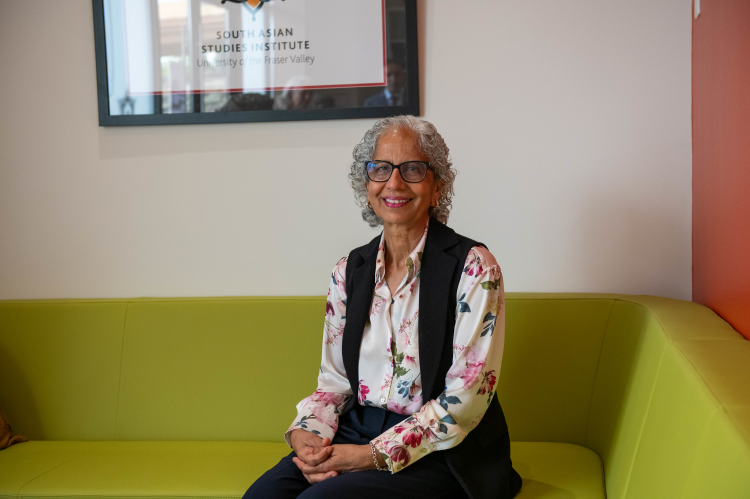For the past two decades, one name has been associated more than any other with the South Asian Studies Institute at the University of the Fraser Valley.
When you think of SASI, the institute's founding director, Dr. Satwinder Bains, comes to mind pretty quickly. That changed on August 15 when Satwinder formally retired. She is succeeded by Dr. Jatinder Mann, newly hired by UFV. And yes, she leaves big shoes to fill.

Dr. Satwinder Bains retired as the founding director of the South Asian Studies Institute at UFV on August 15.
Satwinder has guided the community-focused research institute since its official opening in 2006 and was involved in lobbying, fundraising, and advocating for it since the early 2000s, when it was just a dream.
SASI started out as the Centre for Indo-Canadian Studies and Research. It officially launched in 2006 and changed its name to SASI in 2016 to reflect a broader focus.
Satwinder's connection with UFV started before SASI was launched, when she was working for Abbotsford Community Services. She collaborated with then-Social Work department head Gloria Wolfson to develop curriculum focused on South Asian culture and anti-racism work. She then taught those courses as a sessional.
"That put my boots on the ground here on campus. As I looked around, I could see that UFV could really benefit from curriculum that reflects our community. The Fraser Valley was changing. It was time to make room for other voices, other backgrounds."
When the provincial government announced funding for research chairs focused on business, those hoping to increase focus on the Indo-Canadian community embraced that angle too. Their challenge? Raise $1.25 million to fund the BC Regional Innovation Chair on Canada-India Business and Economic Development, which would be matched by the government. UFV president Skip Bassford liked the concept and launched a community campaign in 2003 to raise funds for the chair.
The campaign was successful, and DJ Sandhu was named the first holder of the Canada-India Business and Economic Development chair. While he focused on building connections in India, Satwinder and others concentrated on the other part of the dream: the Centre for Indo-Canadian Studies and Research. And they succeeded.
On April 2, 2005, then-premier Gordon Campbell visited the Abbotsford campus to announce the Centre for Indo-Canadian Studies and Research, to be housed in a former childcare centre. It officially opened early in 2006.
And its leader? Satwinder Bains. After being heavily involved in campaigning for the centre she became its founding director.
"We sold the community on a dream, and then we realized it for them," she recalls. "We promised to record history, to create a place on campus for our community. And everyone from farm labourers to big companies was enchanted by our dream and supported it. People who had never set foot on campus came to see our centre as their space."
It wasn't the physical centre that drew the community support so much as the activities it made possible: visiting scholars and lecturers, symposia, special courses, publications with a historical focus, travelling museum exhibits, and research projects.
The most ambitious was the South Asian Canadian Legacy Project, which includes a digital archive, travelling museum exhibit (Haq and History), a South Asian history book, historic site recognition, educational curricula, and a labour history book. It was celebrated with a launch attended by provincial and federal government representatives in 2022.
When asked what she is most proud of connected to her time leading SASI, Satwinder says it was the opportunities offered to students, countless numbers of whom served as research assistants over the decades.
"We have trained so many students here from many different disciplines. We planted seeds, and they've gone on to have a real impact in many sectors, creating more spaces for sharing the story of South Asians in Canada."
She is also proud of the relationships SASI built internally with departments and members of the UFV community.
"We've seen many of our students go on to jobs at UFV, and we've had many other impacts on the university as a whole."
Satwinder is grateful to past and current colleagues at UFV who believed in the dream, as well as to members of the community locally, regionally, and nationally.
"You have to dig deep to do this work. It takes a lot of social capital," she says. "Our approach has always been relational, not transactional. We've had good support from the university and the community. We've been able to build bridges."
As Satwinder hands over directorship to Dr. Jatinder Mann, she's confident that there is enough work to keep him and everyone associated with SASI busy for dozens of years.
"I'm a starter. I love starting things. I leave it to those who follow after me to continue the good work of SASI."










